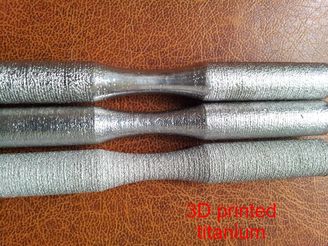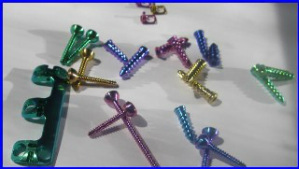
- Titanium Electropolishing:
- high voltage eco-friendly plasma electropolishing;
- low voltage plasma electropolishing (Ultrapolishing)
- low voltage acid-free electropolishing.
Different titanium alloy types require different electropolishing regimes and different electrolytes. We can electropolish and install production lines for all alloy types: pure titanium (grades 1-4), titanium alloy 6Al4Va (grade 5), beta- alloy, and other less popular titanium alloy types. In order to select the most appropriate electropolishing method, send some samples for testing.
Titanium Powder Injection Molding (PIM) is gaining its popularity in MD&M world - our Ultrapolishing technology can electropolish molded titanium and stainless instruments.
We are also experimenting with Ultrapolishing 3D-printed titanium (3D).
- For large titanium surfaces we suggest titanium cleaning gels, sprays or chemical polishing solutions. Some blends are Hydrofluoric acid free. Contact us if you want to be able to make titanium cleaning gels or electrolytes inhouse.
- Titanium Volcano Anodizing
- Titanium Type II anodizing - from simple anti-galling treatment for medical implants - to more expensive hard anodizing to fit airspace industry requirements. No problem to anodize multiple parts simultaneously. The anodized coating is free from white "fur" as in conventional technology. Excellent anti-galling and lubricated quality, meets AMS 2488 requirements. Watch the video below .

Titanium color anodizing - consulting on how to improve the existing production process, or delivery and installation of the processing equipment and know-how. The most important thing in titanium color anodizing is to properly activate the titanium surface. If activation is too strong, then the colors become unpleasantly bright. If activation is inconsistent, the colored surface has dull areas, colors are hard to repeat during mass production. As an alternative - electropolished by our methods titanium implants do not require surface activation step prior to color anodizing.
